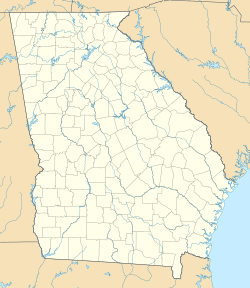Mandeville Site facts for kids
| Location | Clay County, Georgia, |
|---|---|
| Region | Clay County, Georgia |
| Coordinates | 31°46′9.08″N 85°7′0.91″W / 31.7691889°N 85.1169194°W |
| History | |
| Cultures | Deptford culture, Middle Woodland, South Appalachian Mississippian culture |
| Site notes | |
| Excavation dates | 1950 |
| Archaeologists | Clarence Bloomfield Moore |
| Architecture | |
| Architectural styles | platform mound |
The Mandeville Site (9CY1) is an important archaeological site in Clay County, Georgia, in the United States. An archaeological site is a place where people lived a long time ago, and we can find clues about their lives. This site is now hidden underwater in the Walter F. George Reservoir. This reservoir is part of the Chattahoochee River basin.
Contents
A Look Back in Time at Mandeville
The Mandeville Site was first settled by ancient people during a time called the Deptford period. This was a very early time when people lived in villages.
Later, during the Middle Woodland period, people continued to live at the site. They also started building two large mounds. These mounds were like big hills made by people.
Evidence from pottery also shows that people from the Early Swift Creek culture lived here.
Even later, during the Mississippian period, one of the mounds (Mound A) was changed. It became a platform mound. This means it had a flat top, often used for important buildings or ceremonies.
Digging Up the Past: Excavations
Excavations are when archaeologists carefully dig into the ground to find and study old objects and structures.
The Mandeville Site was first visited by an archaeologist named Clarence B. Moore around the year 1900. He did some small tests but did not dig much because he didn't find many things right away.
In 1950, a team from the University of Georgia visited the site. They did some minor digging on the surface.
The most thorough excavations happened in 1959 and 1960. These digs were led by Arthur Kelly, James H. Kellar, and Edward V. McMichael. They worked before a dam was built, which created the Walter F. George Reservoir. Because the site is now underwater, it cannot be dug up anymore.
What the Site Looked Like
The Mandeville Site has two main mounds. Mound A is a flat-topped mound, like a platform. Mound B is a large, dome-shaped mound, which was used for burials.
Mound A is about 240 feet (73 m) long and 170 feet (52 m) wide. It stands about 14 feet (4.3 m) high. Mound B is smaller, about 140 feet (43 m) long and 80 feet (24 m) wide.
Between these two mounds, there was a village area. This village covered about 40 acres (0.16 km2).
Archaeologists found evidence of an even older village under Mound A. This village dates back to the Deptford period. They found signs of small, round houses and pits from this time.
The first layers of the mounds were built during the Late Deptford Period. Later cultures continued to build on top of these original structures. The site was left empty for about 500 years during the Woodland Period. Then, people returned and lived there again during the Mississippian Period.
Clues from the Past: Artifacts
Artifacts are objects made or used by people in the past. At the Mandeville Site, the most important artifacts found were ceramics. Ceramics include things made from clay, like whole pots and pieces of broken pottery called potsherds.
Archaeologists also found tools made from bone and sharp stone points, which might have been used for hunting. They also found flake knives, which are sharp tools made from stone flakes.
Interestingly, they found pieces of a ceramic figurine. These pieces included the head and two parts of the body.
 | Leon Lynch |
 | Milton P. Webster |
 | Ferdinand Smith |


